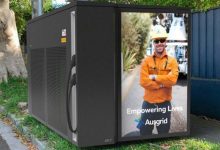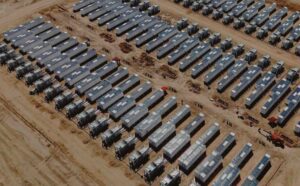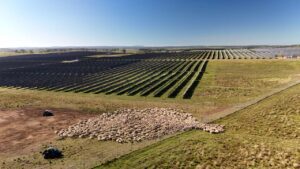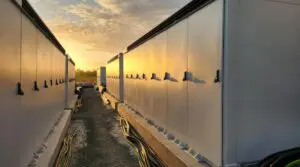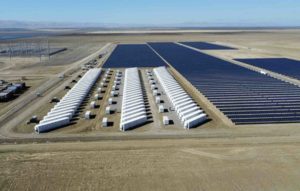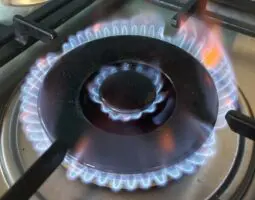BlackRock, the world’s biggest asset manager, says it is eyeing more battery storage projects in Australia, as well as looking at both offshore wind and small solar and storage projects as the energy transition accelerates.
Earlier this week, BlackRock raised more than $500 million of equity to help fund the $1 billion Waratah Super Battery, which is being contracted to act as a kind of giant “shock absorber” to the grid. At 850MW and 1680MWh out will be the biggest battery in Australia and one of the largest of its type in the world.
BlackRock, through its recently acquired battery subsidiary Akaysha Energy, has at least two more big battery projects in the pipeline, at Ulinda Park in Queensland and at Orana in the central west of NSW. And BlackRock’s head in the Asia Pacific, Charlie Reid, says there is no shortage of capital for such assets.
“We were originally targeting $400 million of capital (for Waratah). So we were oversubscribed, I think that shows the weight of capital that is available for energy transition assets in Australia,” Reid said in an interview on RenewEconomy’s weekly Energy Insiders podcast.
Reid says construction has already started on the Waratah battery and it will be complete by 2025. Over time it could grow by “several hundred megawatt hours”, as demand for its services grow.
“We’ll be playing in the merchant markets, with price arbitrage and FCAS services,” Reid says. “And then over time, we’ll be looking to selectively enter into new offtake agreements with corporates and others.
“And there is the ability to expand the site. So that is something that we will consider if we can find the right off-take agreements to match the capacity.”
Reid says there is clear interest from gen-tailers and others for more battery storage to help in the switch from coal to renewables.
“Battery storage has become the key enabling technology of the energy transition,” Reid says.
Batteries getting cheaper
“Batteries are getting cheaper over time, particularly as more batteries are being deployed in EVs, and we see the supply crunch and pricing for batteries using lithium have come down.
“I think in that two to four hour space, batteries will play a pretty unique role. And that’s partly because batteries are becoming so much cheaper than other forms of storage. And they can be deployed as at such speed.”
The details of that Waratah contract have not been released, but Reid says they will over time. He says investors generally targets yields in the high single digits, given the high yield environment at the moment, and returns in the low double digits.
“But he sees no problems attracting capital to Australia, despite the impact of the US Inflation Reduction Act.
“If you look more broadly at the $200 trillion of capital that needs to go into the economy to reach Net Zero to fund climate infrastructure, over half that will go into the Asia Pacific region,” Reid says
“The developments that have taken place in Australia and other Asian economies may not quite have the scale of the inflation Reduction Act. But I would say that capital is increasingly drawn to Australia and the Asia Pacific as a key destination in the sector.”
Offshore wind
Reid says BlackRock is also looking at other technologies in the Australian market, including offshore wind, small-scale solar and battery projects, and EV charging through Jolt.
On offshore wind, BlackRock has been looking at Taiwan and South Korea, but also sees big opportunities in Australia, where the first of at least six offshore wind zones have been declared.
“Australia is emerging as one of the most important offshore wind markets … we are reviewing opportunities in both Victoria and New South Wales.”
Small scale solar and storage is also attractive, Reid says, because large scale solar is becoming more difficult and small scale solar farms do not have to contend with complex connection processes.
“Building utility scale solar in the Australian market is challenging, particularly as it relates to connecting into the grid and potential curtailment issues. So we prefer, from a risk perspective, small scale solar. And also we tend to find that smaller assets … provide a higher return for investors.”
More EV chargers
BlackRock is also investing in what Reid describes as “urban medium charging” through Jolt, which is supporting its free charging offering with advertising, and more recently in Canada, providing free wi-fi.
“We’ve got a pipeline of around 5,000 charges (in Australia) which we’ll have to deploy over the coming years … and working sort of advertising and free Wi Fi charging and combined with events.
“At Black Rock we’ve talked about the three Ds driving infrastructure, so decarbonisation digitalization and decentralisation. I think Jolt is a great example of that. It’s a great business model.
“It helps, really with the early transition to EV charging when revenues are uncertain. … we essentially subsidise the EV charging from the revenues from outdoor advertising.
You can listen to the full interview with Charlie Reid on the Energy Insiders podcast here.

